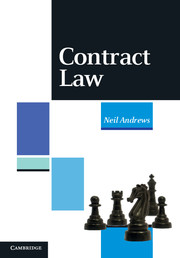Book contents
- Frontmatter
- Contents
- Preface
- Table of cases
- Table of statutes
- Table of statutory instruments
- Part I Introduction
- Part II Formation
- Part III Consideration and intent to create legal relations
- Part IV Third parties and assignment
- Part V Vitiating elements
- Part VI Terms and interpretation
- Part VII Breakdown and liability
- 16 Frustration
- 17 Breach and performance
- Part VIII Remedies for breach
- Part IX Illegality and public policy
- Part X The future
- Appendix: A who's who of contract law
- Bibliography
- Index
16 - Frustration
from Part VII - Breakdown and liability
- Frontmatter
- Contents
- Preface
- Table of cases
- Table of statutes
- Table of statutory instruments
- Part I Introduction
- Part II Formation
- Part III Consideration and intent to create legal relations
- Part IV Third parties and assignment
- Part V Vitiating elements
- Part VI Terms and interpretation
- Part VII Breakdown and liability
- 16 Frustration
- 17 Breach and performance
- Part VIII Remedies for breach
- Part IX Illegality and public policy
- Part X The future
- Appendix: A who's who of contract law
- Bibliography
- Index
Summary
INTRODUCTION
Summary of main points
(1) Frustration is a narrow doctrine; it is not enough that a contract becomes unexpectedly difficult or more expensive to perform on one or both sides; the courts will not relieve a party from a merely onerous turn of events. English judges possess no general power to absolve contracting parties from their obligations on the ground of hardship arising after formation. Aggravating circumstances, even a commercial crisis for the relevant party, will not constitute frustration unless Lord Radcliffe's test in Davis Contractors Ltd v. Fareham Urban District Council (1956) (cited at 16.02) can be satisfied.
(2) The modern frustration doctrine concerns three situations: (a) supervening illegality, that is, performance of the contract becomes illegal because of a legal change subsequent to the contract's formation; (b) other instances of impossibility; or (c) severe obstruction of contractual performance (‘frustration of the venture’; sometimes referred to as ‘frustration of the purpose’ by some modern commentators), although this third category is very seldom successfully pleaded.
[…]
- Type
- Chapter
- Information
- Contract Law , pp. 444 - 473Publisher: Cambridge University PressPrint publication year: 2011



